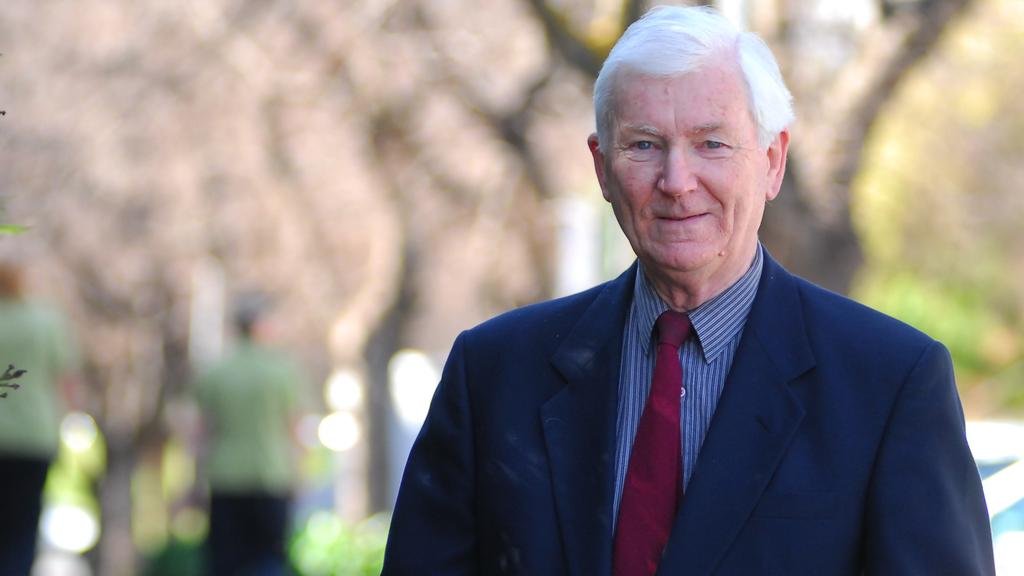An extract from a tribute by author, John Bridgland, one of David Plumridge’s close friends.
Read the full tribute here: (PDF, 3 pages 161 Kb)
David Allen Plumridge, AM. 1 September 1932 to 10 March 2024
Pic: The Advertiser, 2011
David Plumridge AM was a good man, of uncommonly patient and wise judgement. He was also someone who would not abide hyperbole and political spin: lies, damn lies and statistics that misled.
Not that he was aggressive or argumentative, quite the contrary. He was one of the most quietly respected elected members to have graced the City Council’s chamber during his seven years there, 2007–14.
That series of two terms was in fact an extension of a long local government career that went back many years to Adelaide’s City of Salisbury, where he served with distinction as a councillor, and later, Mayor.
There exists among some local government observers an impression that most elected members have little real experience necessary for the job. But as a city area councillor, David was an exception. He was highly knowledgeable in matters of SA State and local government governance, town planning and related procedures, architecture, and land-use politics. As a result he was often seriously underestimated by those who served with him.
He and wife Gladys moved to the city in the early 2000s. There, city and especially Park Lands matters soon attracted his close attention. In 2006 controversial Labor State Government plans emerged to build a multi-storey ‘grandstand’ in Victoria Park, otherwise revealed as a $33m corporate box intended for use by an elite crowd during an annual motor race.
Picture: Roy VanDerVegt
He stood for council election in late 2007 and was among a winning majority of Park Lands-aware Councillors when they promptly blocked the project. Labor under Premier Mike Rann got a bloody nose and never forgot the humiliation. Only one minister in that administration, Dr Jane Lomax-Smith, MP for Adelaide, had openly opposed the project. Labor’s humiliation would forever change the way the party would in the future prosecute its development project raids on the green, open spaces of the Park Lands. And there would be many over the subsequent years 2008 to 2018, when Labor finally ended its four-term run.
David regularly wrote public letters and gave media interviews. Journalists liked his measured critiques of the ethically and morally bankrupt rationales for commercial or State Government advantage put about in the city, especially to justify exploiting the Adelaide Park Lands, which were under the custodianship of the City Council. He made many friends through his staunch support for the preservation of the landscapes surrounding the city.
David’s critiques were always quietly and rationally delivered. But no agency was immune from his analysis – including his own City Council when it came to transparency, or the lack of it. Upon election he commenced a regular newsletter and maintained it for his two terms. It has left historians with a detailed record of great value. At the start of his second term, as Deputy Lord Mayor in 2010, he wrote:
“In all my 30-plus years of local government service I have worked for openness and transparency in dealing with the business of the community and I have fought against council decisions being made behind closed doors.”
In 2011, a year after SA Labor had won its third consecutive election, the State Government introduced legislation to build a huge new sports stadium at the Adelaide Oval, involving the demolition of the SA Cricket Association’s heritage-listed grandstands.
Speaking generally about planning, he noted: “Now of course many key decisions, especially in the planning area, are made with absolutely no consultation, thanks to the policies of the State Government pandering to the ‘build-at-any cost’ lobby which can now evade the need to consult.”
David was equally critical of related aspects pursued by the new Labor Weatherill government after 2011, expressing his well informed planning and architectural perspective. On Labor’s Greater Riverbank Precinct Implementation Plan, capitalising on the authority of his position of as Deputy Lord Mayor, he wrote:
“... it is more about building new hospitals, massive new sporting facilities with attendant car parking [the Adelaide Oval stadium], grand schemes for 15-storey office and apartment blocks on the ‘wasted’ Festival Plaza, bastardising the magnificent architecture of the Railway Station [for a casino]
“…All these projects ... are on the Park Lands. They will do nothing to activate these spaces for the public; they will undermine regulated developments in the central CBD and must surely be driven by a desire for short-term results.”
Subsequent developments confirmed the accuracy of his observation.
Pic: City of Adelaide
David had a particular passion for conserving the ‘character and heritage’ of the city. Many of the government’s activities threatened these features. They also threatened the landscapes of the Park Lands.
Towards the end of his second term, and as the new policy reign of Labor’s Premier Jay Weatherill began to gather speed, David noted, in May 2013:
“Over recent months there seems to have been a rising campaign mounted by the Murdoch Press [News Corp], encouraged by the usual suspects in the property and development industries and condoned by compliant State Governments (and Oppositions) to put about the idea that the Park Lands are little more than a barren wasteland crying out for ‘long-overdue development’. Opponents of that view are dismissed as naysayers, whereas in reality it is they who are maintaining [Colonel] Light’s Vision ...
“The Adelaide Park Lands must be preserved, not just for the needs of the increasing number of residents, but also for the enjoyment of all South Australians. We need visionaries working hard to preserve the vision that Colonel Light promulgated, and which we should all commemorate: his vision to give the community the precious gift of ‘just plain open space’.
“Appropriating Park Lands for commercial developments, driven by greed and vested interests, should not be facilitated by Governments using heavy handed legislation to destroy the purpose and pleasure of our precious Park Lands.”
The city owes much to this quietly passionate man. It should preserve his memory, as well as the clarity of his statements regarding transparency, accountability, and Adelaide’s Park Lands.
A personal note
I was a close friend of David’s across the whole of his elected period, and for years beyond. We had many conversations and I enjoyed his wry sense of humour. He had great skill in identifying and analysing the political and administrative city undercurrents, sometimes not obvious to casual observers.
Most Councillors and State politicians are deeply invested in the cultures of confidentiality practised at both government levels. It’s in their personal interest not to share information expected by their constituencies, and they can reference the law as a reasonable excuse.
He was unlike many elected members, who capitalised on local organisations’ support to get elected, but upon election immediately forgot all about them. David spoke at many [North Adelaide] Society meetings. He enjoyed ‘face-to-face’. He ‘put in the time’. He chased up details. He kept his promises. He never neglected his communities. And obviously, when the next election loomed, he had a ready group to letterbox their local streets to help him get elected.
Alas, the numbers did not run his way at the 2014 poll. But he achieved in two terms much more than some of his council colleagues who lingered, without much result, for multiple subsequent terms.
Read John Bridgland’s full tribute here: (PDF, 3 pages 161 Kb)
See other reporting of David Plumridge’s death at:





